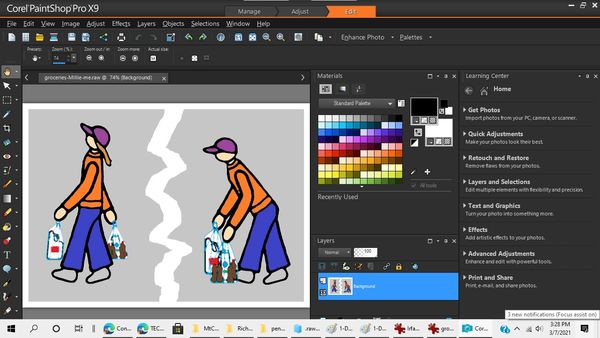Conversion of an old jpg file?
Feb 13, 2021 09:14:12 #
PaulBrit wrote:
I have a photograph taken in 2006 with a Lumix cam... (show quote)
Well, you could open and resave as a tiff image. TIFF is as close as you can come regarding edibility to a RAW image. While you are at it you might consider changing to a 16-bit image (although I doubt that will add much).
Feb 13, 2021 09:25:06 #
BobHartung wrote:
Well, you could open and resave as a tiff image. TIFF is as close as you can come regarding edibility to a RAW image. While you are at it you might consider changing to a 16-bit image (although I doubt that will add much).
Converting a jpg to a tif will do nothing beyond increasing the size of the file. The data needed to improve the image are not there in the jpg, having been discarded in the original compression forming the jpg from the sensor data (whether that is done in camera or in post makes no difference).
Yes, you CAN edit a jpg with any editor, you can even edit it in camera raw. But that does not mean you are using the raw data. There is no raw data. You have the jpg and that's all.
Feb 13, 2021 09:34:12 #
DirtFarmer wrote:
Converting a jpg to a tif will do nothing beyond increasing the size of the file. The data needed to improve the image are not there in the jpg, having been discarded in the original compression forming the jpg from the sensor data (whether that is done in camera or in post makes no difference).
Yes, you CAN edit a jpg with any editor, you can even edit it in camera raw. But that does not mean you are using the raw data. There is no raw data. You have the jpg and that's all.
Yes, you CAN edit a jpg with any editor, you can even edit it in camera raw. But that does not mean you are using the raw data. There is no raw data. You have the jpg and that's all.
Agreed, but once in tiff format you will not suffer further degradation with saves.
Feb 13, 2021 09:36:07 #
PaulBrit wrote:
I have a photograph taken in 2006 with a Lumix cam... (show quote)
You don't say whether this is already in digital format or whether it is a print on paper. If the latter, then scan it in and make it an "Image Recovery" exercise.
Feb 13, 2021 09:57:12 #
DirtFarmer wrote:
Converting a jpg to a tif will do nothing beyond increasing the size of the file. The data needed to improve the image are not there in the jpg, having been discarded in the original compression forming the jpg from the sensor data (whether that is done in camera or in post makes no difference).
Yes, you CAN edit a jpg with any editor, you can even edit it in camera raw. But that does not mean you are using the raw data. There is no raw data. You have the jpg and that's all.
Yes, you CAN edit a jpg with any editor, you can even edit it in camera raw. But that does not mean you are using the raw data. There is no raw data. You have the jpg and that's all.

Feb 13, 2021 10:10:03 #
BobHartung wrote:
Agreed, but once in tiff format you will not suffer further degradation with saves.
The "jpg degradation" is something I have been studying. Preliminary results indicate that the degradation with successive re-compressions are not something that continues ad infinitum. The changes due to successive compressions saturate at some point. The point of saturation depends on the details of the image and the quality (degree off compression).
Preliminary study is at https://www.uglyhedgehog.com/user-page?upnum=3000 and that will be updated when I get through the current project.
Mar 7, 2021 15:48:02 #
CHG_CANON wrote:
BTW, rather than an options menu, tell us / show us the resulting file name. It will go so much further in supporting your observation. We'll be watching for that update.
My apologies for taking a month to respond! [Gmail had decided to keep my regular emails from UglyHedgehog in my primary tab but put the notices about responses to the threads I have posted in went to my social media tab. And of course, I had not noticed that for a month or more.]
So, CHG_CANON, is this what you wanted?? The first is a screen capture from Corel PhotoShopPro X9 after it opened my RAW image. And the second one is the RAW image itself. My preview does not show the image for "groceries-Millie-me.raw", but hopefully it will show up here.
Are these what you wanted to see? --Richard
Mar 7, 2021 16:41:31 #
PaulBrit wrote:
I have a photograph taken in 2006 with a Lumix cam... (show quote)
It's like someone else pointed out in another thread - you can't unbake the cake and end up with sugar, flour, eggs, milk, vanilla, etc. Jim will be disappointed.
Mar 7, 2021 16:47:58 #
profbowman wrote:
My apologies for taking a month to respond! Gmail... (show quote)
It seems this "raw" format is Corel PhotoShopPro specific?
Mar 7, 2021 16:55:18 #
Gene51 wrote:
It's like someone else pointed out in another thread - you can't unbake the cake and end up with sugar, flour, eggs, milk, vanilla, etc. Jim will be disappointed.
But I guess I don't actually agree with that analogy. Computer science has a long history of compressing and uncompressing without losing data. For example, recall zipping and unzipping files which is still occasionally used today. Since I have spent much of my life writing computer programs, I do not think of them as having the same restrictions as chemical reactions, which I have also taught. --Richard
Mar 7, 2021 17:01:46 #
profbowman wrote:
But I guess I don't actually agree with that analogy. Computer science has a long history of compressing and uncompressing without losing data. For example, recall zipping and unzipping files which is still occasionally used today. Since I have spent much of my life writing computer programs, I do not think of them as having the same restrictions as chemical reactions, which I have also taught. --Richard
Zipping and unzipping a file that maintains the exact same contents down to the bit is not the same as converting a RAW into another format. The RAW conversion to a display format is analogous to a chemical reaction, where data in the RAW no longer exists in the output format.
Mar 8, 2021 00:53:42 #
CHG_CANON wrote:
Zipping and unzipping a file that maintains the exact same contents down to the bit is not the same as converting a RAW into another format. The RAW conversion to a display format is analogous to a chemical reaction, where data in the RAW no longer exists in the output format.
OK, some of this is semantics. But a zipped file no longer has the same bits that the unzipped file had. They are compressed by an algorithm that does not lose any of the info stored in the original files so that they can be reconstructed. A zipped file is more like a lossless photo file format, so maybe I did not use a good comparison. --Richard
If you want to reply, then register here. Registration is free and your account is created instantly, so you can post right away.





